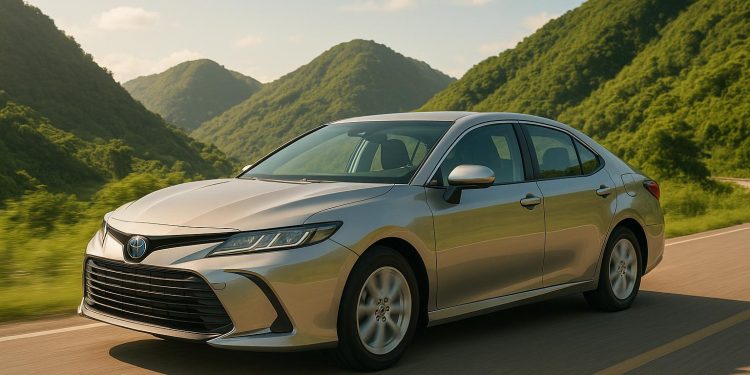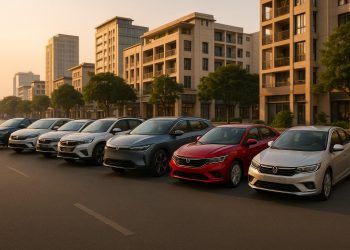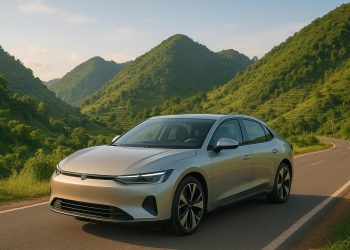Looking for the most fuel-efficient cars in Vietnam? Here’s a quick breakdown of the top options available in 2025. With rising petrol costs and increasing interest in hybrid and electric vehicles, these cars combine fuel savings with performance.
Key Highlights:
- Toyota Corolla Cross Hybrid: Best urban fuel efficiency at 3.01 L/100 km; priced at ₫905 million.
- Haval Jolion Hybrid: Affordable hybrid SUV with 4.2 L/100 km fuel consumption; starts at ₫669 million.
- BYD Seal Hybrid: Premium sedan with 3.9 L/100 km; priced between ₫1.12 billion and ₫1.36 billion.
- Toyota Camry Hybrid: Luxury hybrid sedan offering 4.5 L/100 km; priced from ₫1.46 billion.
- Isuzu MU-X 2025: Diesel SUV with fuel consumption ranging from 7.4 to 8.3 L/100 km.
Quick Comparison:
| Vehicle | Fuel Consumption (L/100 km) | Price Range (VND) | Type |
|---|---|---|---|
| Toyota Corolla Cross | 3.01 (urban), 3.67 (mixed) | ₫905 million | Hybrid SUV |
| Haval Jolion Hybrid | 4.2 (urban), 5.0 (mixed) | ₫669–719 million | Hybrid SUV |
| BYD Seal Hybrid | 3.9 | ₫1.12–1.36 billion | Hybrid Sedan |
| Toyota Camry Hybrid | 4.5 | ₫1.46–1.53 billion | Hybrid Sedan |
| Isuzu MU-X 2025 | 7.4–8.3 | Contact dealer | Diesel SUV |
Vietnam’s hybrid and electric vehicle market is growing fast, with hybrid sales increasing by 64% year-on-year in 2025. Whether you’re looking for budget-friendly options like the Haval Jolion or premium choices like the Toyota Camry Hybrid, there’s a fuel-efficient car to meet your needs.
Top 5 Mẫu Xe Sedan Tiết Kiệm Xăng Nhất Việt Nam Năm 2025 | Bcar Hà Nội – Vương Quốc Gầm Cao
1. Toyota Camry Hybrid
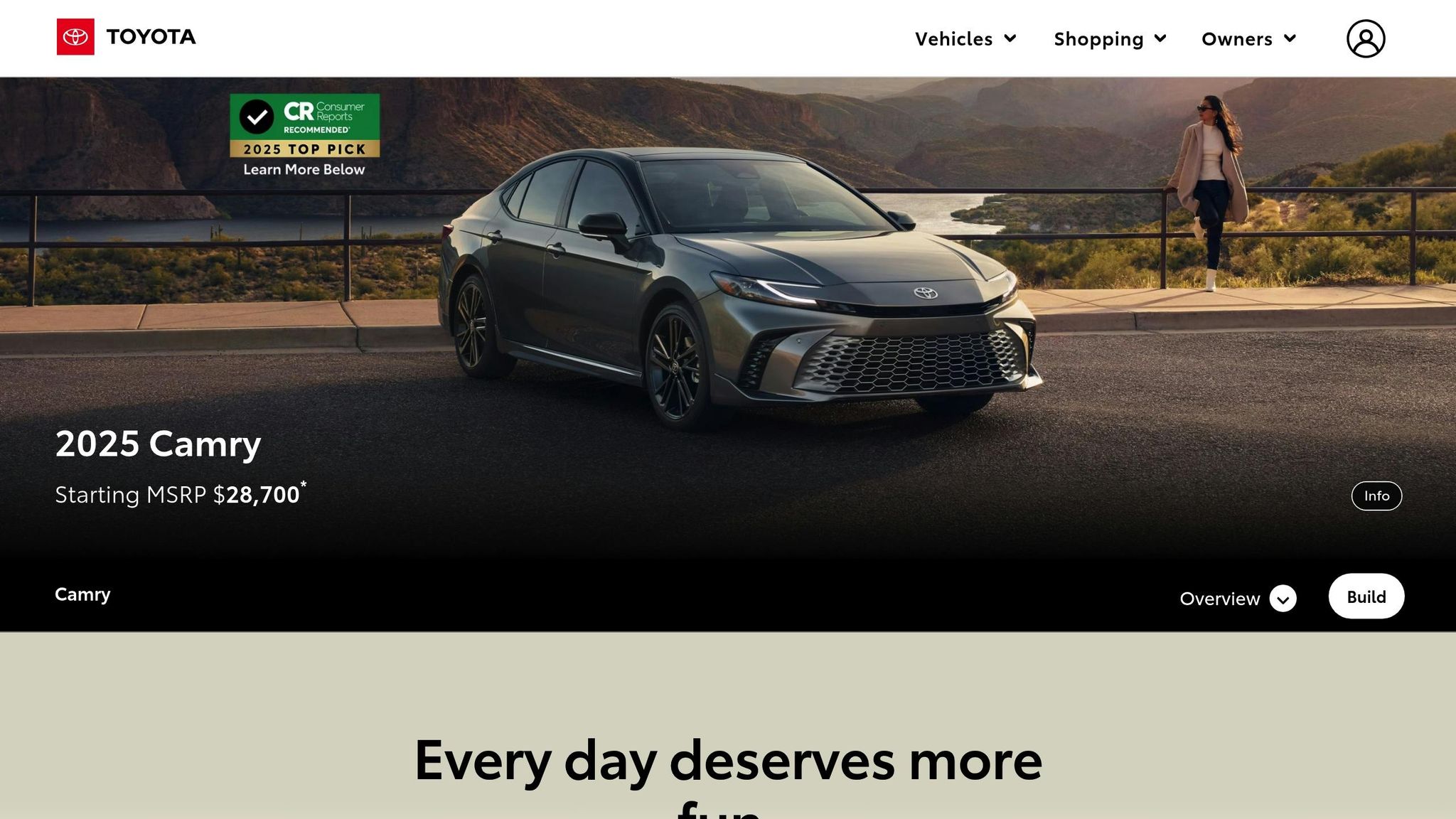
The Toyota Camry Hybrid stands out in Vietnam as a car that combines elegance with impressive fuel efficiency. It reflects Toyota’s expertise in hybrid technology, offering a mix of comfort and practicality. Here’s a closer look at what makes it special:
Fuel Consumption (L/100 km)
Designed to handle Vietnam’s diverse road conditions, the Camry Hybrid delivers excellent fuel efficiency. It consumes just 4.5 litres per 100 kilometres in combined driving scenarios – breaking down to 4.6 L/100 km in the city and 4.4 L/100 km on highways. This marks a 30% improvement in fuel economy compared to the conventional petrol version.
Engine and Hybrid System
Under the hood, the 2025 Camry Hybrid features Toyota’s advanced fifth-generation hybrid system (THS 5). It pairs a 2.5L 4-cylinder engine with dual electric motors, producing a combined output of up to 232 horsepower. Its 252-volt battery charges automatically, ensuring seamless operation. Drivers can choose from four driving modes – Normal, Sport, Eco, and EV – tailoring the experience to their preferences.
Price (VND)
Toyota Vietnam offers the Camry Hybrid in two trims: HEV Mid and HEV Top. The HEV Mid is priced at ₫1.46 billion, while the HEV Top comes in at ₫1.53 billion, both reflecting on-the-road prices in Hanoi. Flexible financing options are available, with down payments ranging from 20% to 35% and loan terms extending up to 60 months.
Availability in Vietnam
Both the HEV Mid and HEV Top variants are readily available through Toyota’s authorised dealerships across Vietnam. Buyers can also take advantage of exclusive promotions and offers tailored to this model.
2. Toyota Corolla Cross Hybrid
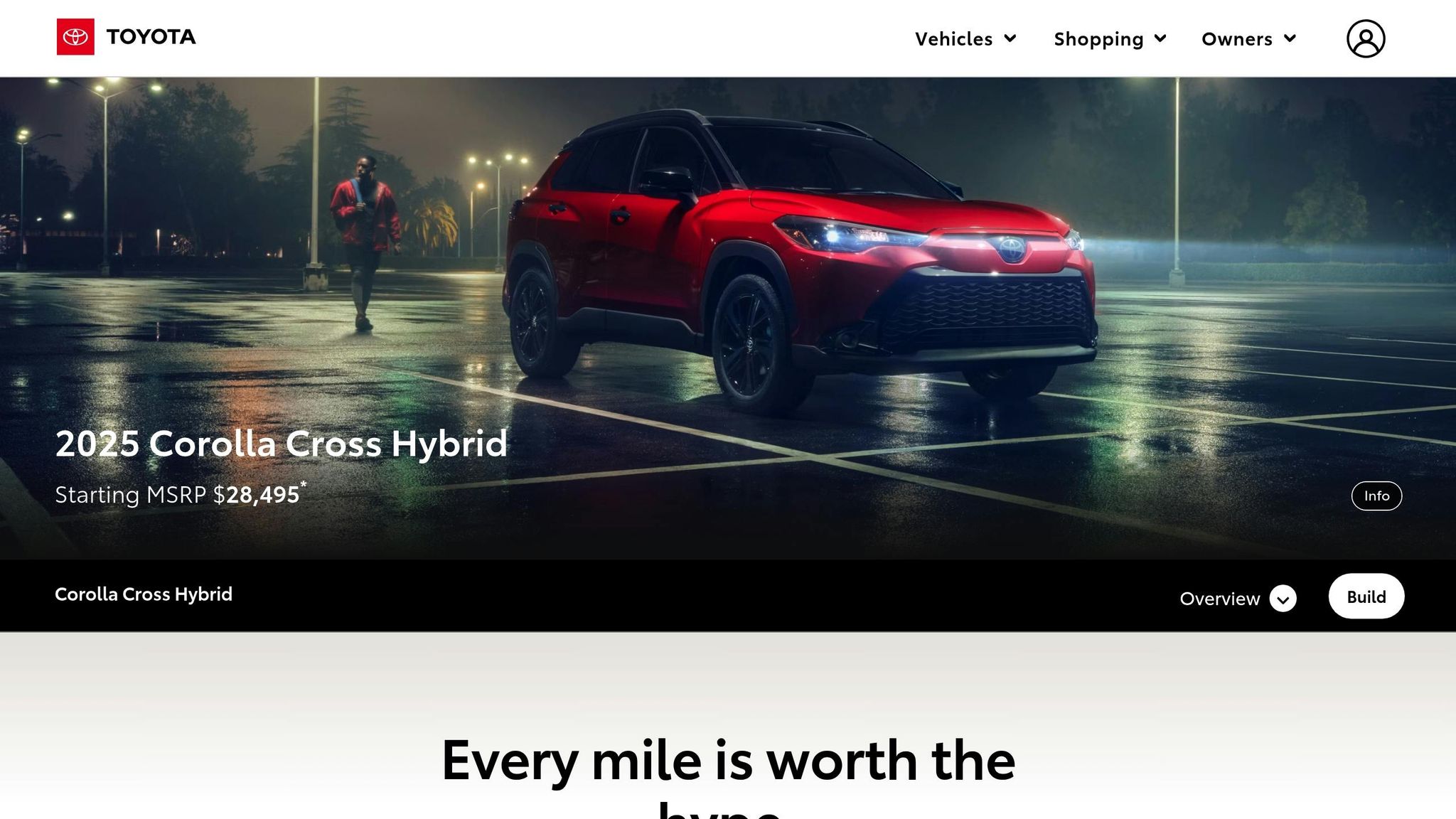
The Toyota Corolla Cross Hybrid stands out as a strong contender in Vietnam’s compact SUV market, particularly for those prioritizing fuel efficiency. It combines hybrid technology with practicality, making it a great fit for families navigating Vietnam’s diverse road conditions. Here’s a closer look at what makes it special.
Fuel Consumption (L/100 km)
The Corolla Cross Hybrid is impressively economical. In city driving, it sips just 3.01 litres of fuel per 100 kilometres, while mixed driving conditions see it using 3.67 litres per 100 kilometres. However, independent tests by AAA in Australia revealed the 2024 model consumed 4.5 litres per 100 kilometres – around 7% more than Toyota’s official figures.
Engine Type and Hybrid System
This hybrid SUV is powered by a 2.0-litre M20A-FXS engine paired with an electric motor, delivering a combined output of 146 kW (196 hp). It comes equipped with either a 6.5-Ah nickel-metal hydride battery or a 4.08-Ah lithium-ion battery. Additionally, regenerative braking enhances its efficiency, especially in urban settings.
Price (VND)
In Vietnam, the Corolla Cross Hybrid 1.8 HEV variant is priced at ₫905 million (on-the-road price in Hanoi). For comparison, the non-hybrid 1.8V variant costs ₫820 million, making the hybrid option about ₫85 million more expensive.
Availability in Vietnam
As of July 2025, the Corolla Cross Hybrid is available at Toyota’s authorized dealerships across Vietnam. Both the hybrid and conventional variants are in stock, often accompanied by promotional deals.
3. Haval Jolion Hybrid
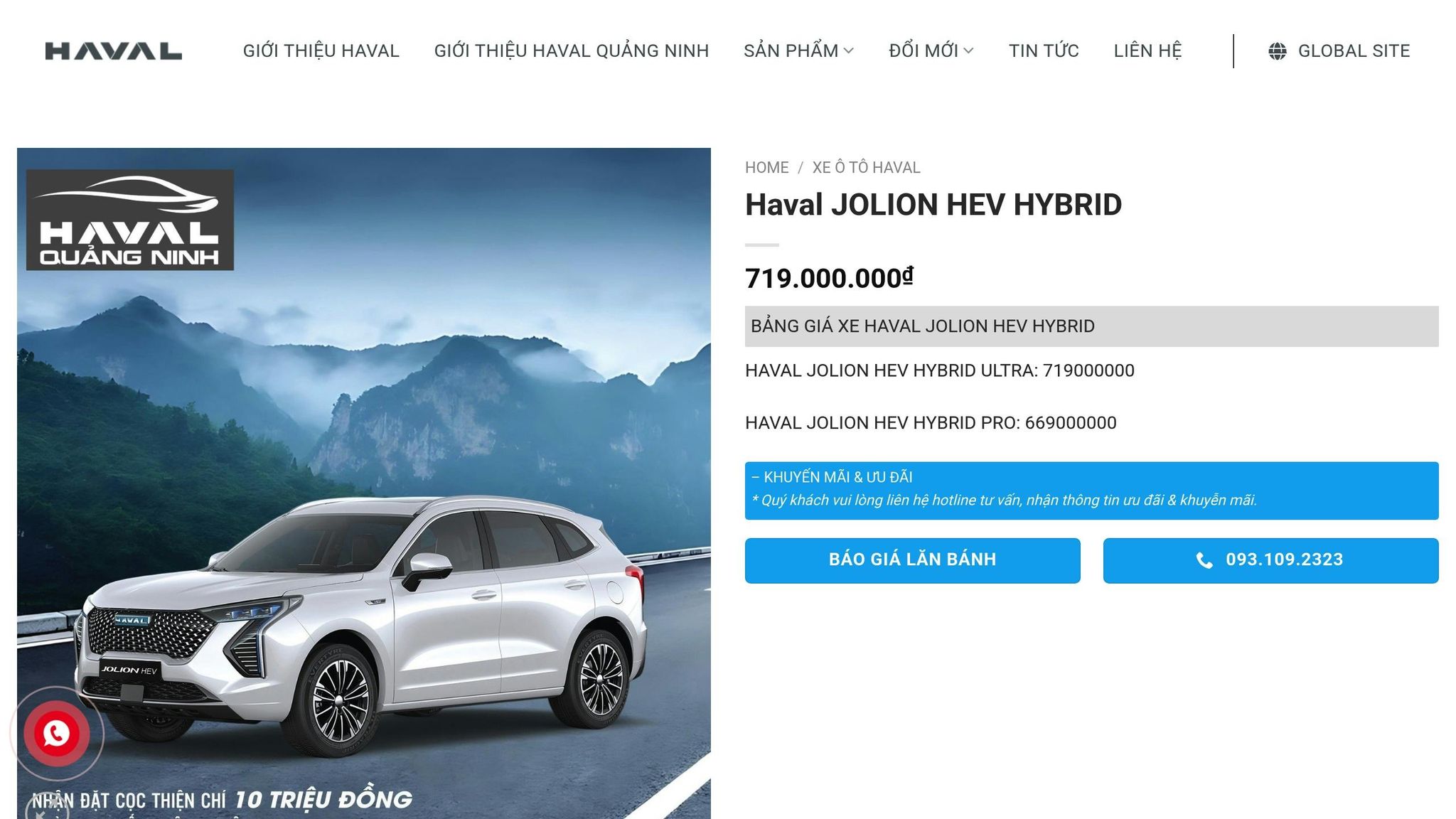
The Haval Jolion Hybrid marks GWM‘s entry into Vietnam’s growing hybrid SUV market. This compact crossover aims to provide a mix of efficiency and affordability, though its fuel consumption numbers suggest a more complex performance in everyday driving conditions.
Fuel Consumption (L/100 km)
According to the manufacturer, the Jolion Hybrid consumes about 4.2 litres per 100 km in urban settings and 5.0 litres per 100 km in mixed driving conditions. However, independent tests conducted in Australia have recorded fuel usage reaching 7.0 litres per 100 km, with the official combined figure standing at 5.1 litres per 100 km. These figures highlight the balance GWM has aimed for between fuel efficiency and overall performance.
Engine Type and Hybrid System
Under the hood, the Jolion Hybrid features a 1.5-litre GW4G15H petrol engine paired with an electric motor. Together, they produce a combined output of 140 kW (188 hp) and 375 Nm of torque. The petrol engine itself delivers 70 kW (125 Nm), while the electric motor contributes 115 kW (154 hp) and 250 Nm. The vehicle uses a Dedicated Hybrid Transmission (DHT) designed to optimize efficiency across different driving modes. Despite weighing 200 kg more than the petrol-only variant, the hybrid can accelerate from 0–100 km/h in 8.6 seconds, compared to 10 seconds for the non-hybrid version.
Price (VND)
The Jolion Hybrid is priced between ₫669–719 million, depending on the trim level and dealership. This pricing positions it as a competitive option in Vietnam’s hybrid SUV segment.
Availability in Vietnam
The Haval Jolion Hybrid is part of GWM’s expanding presence in Vietnam, with the model available at dealerships nationwide. Buyers can choose between the Pro and Ultra variants, both of which compete directly with the MG ZS Hybrid+ in the affordable hybrid crossover category.
sbb-itb-1ccdff5
4. BYD Seal Hybrid
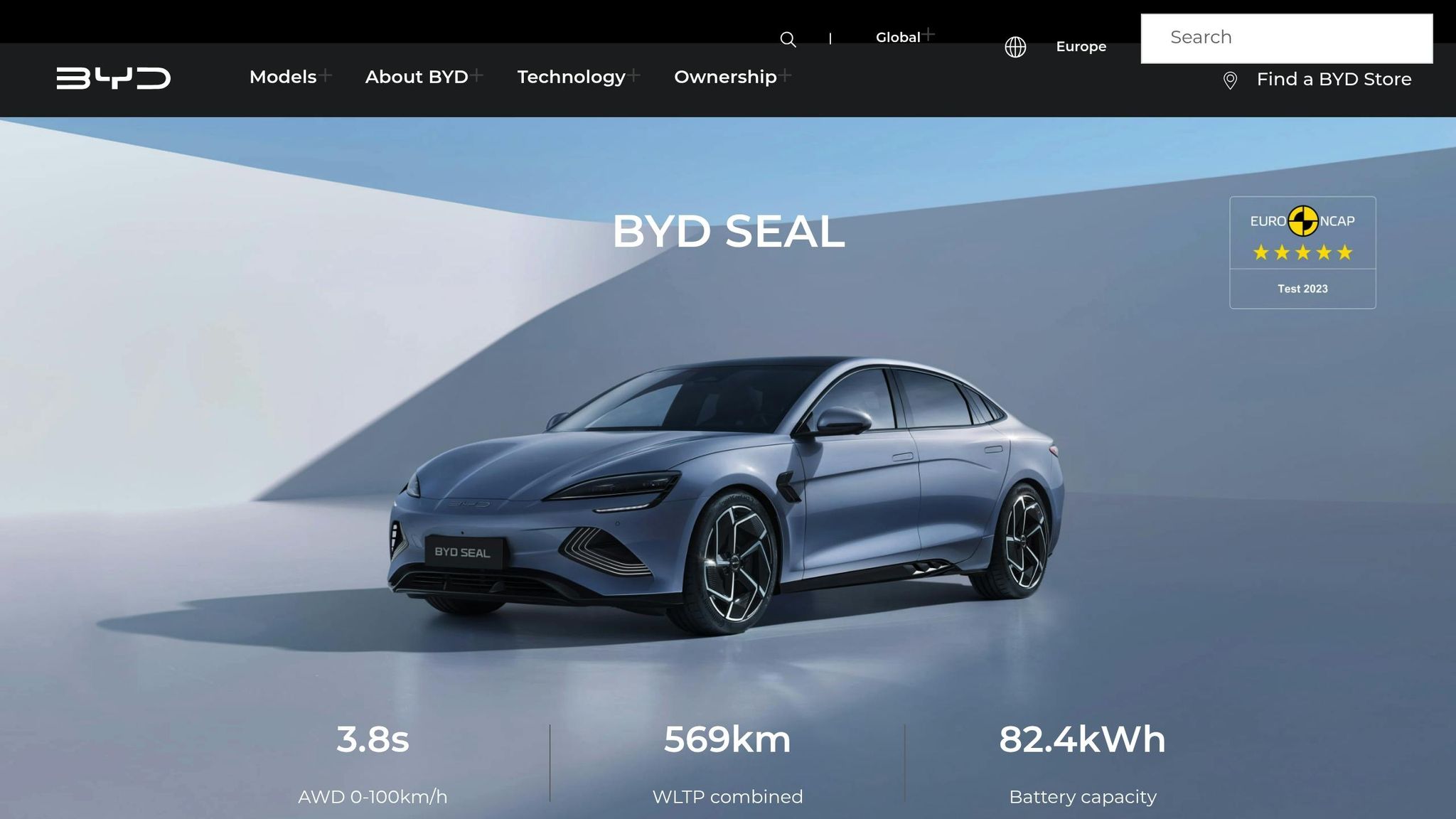
The BYD Seal is making waves in Vietnam’s premium hybrid sedan market, setting a new benchmark for fuel efficiency. As BYD expands its footprint, this sedan stands out with its remarkable performance and thoughtful design. Let’s dive into its fuel efficiency, key features, and other essential details.
Fuel Consumption (L/100 km)
The BYD Seal Hybrid boasts an impressive fuel consumption rate of just 3.9 litres per 100 km, making it one of the most efficient options available in Vietnam. The BYD Seal U DM-i variant offers a slightly higher rate at 6.4 litres per 100 km. Meanwhile, the base model of the BYD Seal 06 DM-i wagon delivers standout efficiency with approximately 3.2 litres per 100 km, equivalent to 74.7 miles per gallon.
Engine Type and Hybrid System
At the heart of the BYD Seal Hybrid is BYD’s Super DM (Dual Mode) Technology, a plug-in hybrid system that combines a 1.5-litre engine with an electric motor. This 5th-generation hybrid system integrates an advanced Electric Hybrid System (EHS) featuring high-speed dual motors, dual controllers, and oil-cooling technology. It also incorporates BYD’s Xiaoyun hybrid engine for enhanced performance. The vehicle is equipped with a Blade Battery starting at 18.3 kWh, enabling a pure-electric range of over 70 km.
Price (VND)
The BYD Seal comes in two variants to cater to different preferences:
- Advanced version: ₫1.12 billion
- Performance version: ₫1.36 billion
These price points position the BYD Seal firmly in the premium sedan category.
Availability in Vietnam
Launched in July 2024, the BYD Seal is now available across Vietnam. To make ownership more accessible, BYD has teamed up with financial institutions like BIDV, VPBank, and VietinBank to provide loan programs covering up to 85% of the vehicle’s value with preferential interest rates. Buyers also benefit from a robust warranty: six years or 150,000 kilometres for the car and eight years or 160,000 kilometres for the battery system. This comprehensive support underscores BYD’s commitment to promoting sustainable driving solutions in Vietnam.
5. Isuzu MU-X 2025
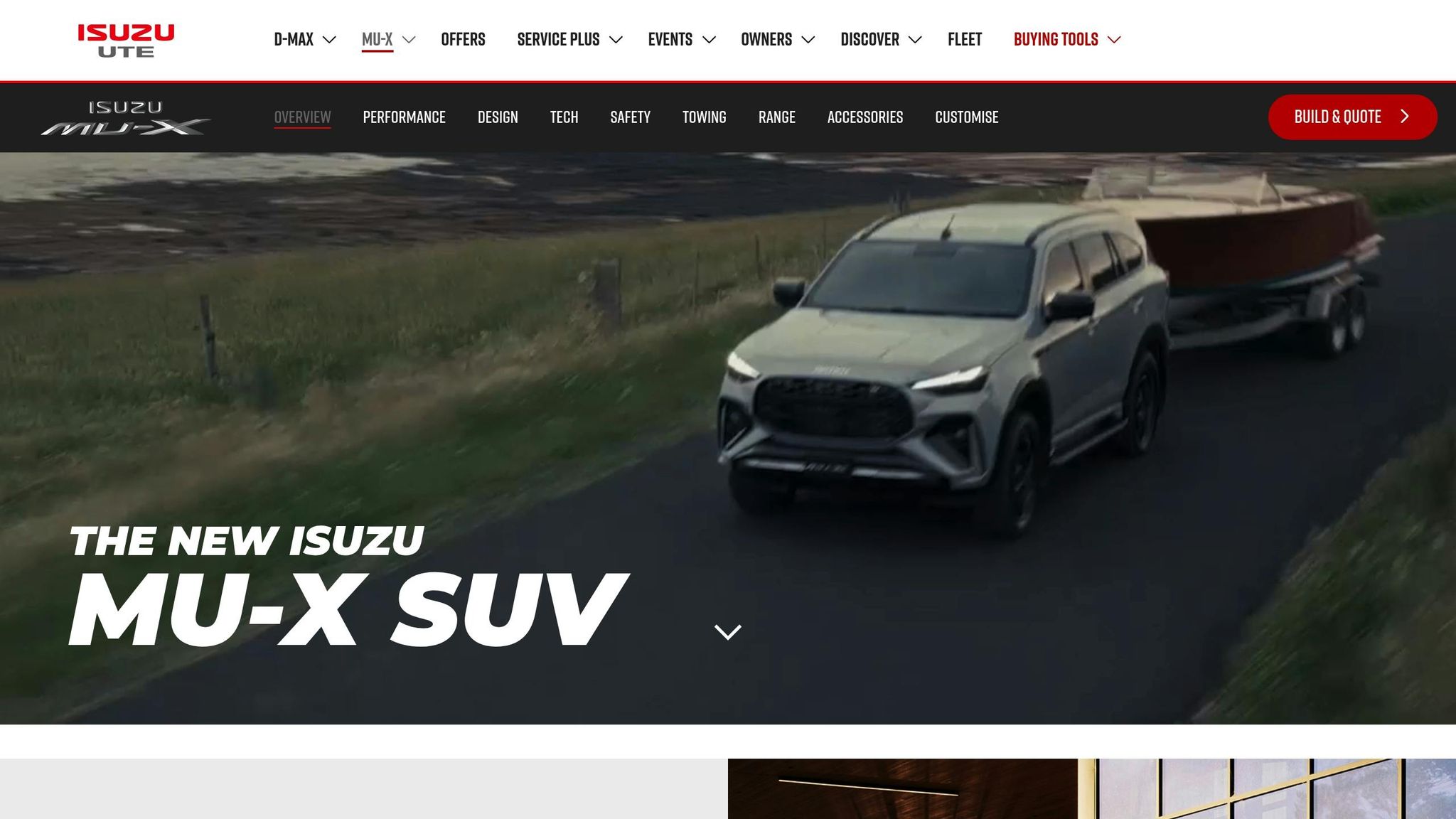
While many vehicles today are embracing hybrid technology, the Isuzu MU-X 2025 takes a different route. This SUV sticks with turbo-diesel technology, offering a practical solution for those looking to balance performance with fuel efficiency. With its updated design and added safety features, the MU-X 2025 caters to buyers in Vietnam who value reliable, time-tested technology in a market where fuel costs are a growing concern.
Engine Type and Turbo-Diesel Options
Instead of incorporating hybrid systems, the Isuzu MU-X 2025 focuses on diesel power alone. Buyers can choose between two turbo-diesel engine options: a 1.9-litre four-cylinder and a 3.0-litre four-cylinder.
- The 1.9-litre engine delivers decent performance but tends to feel less dynamic and louder when pushed hard.
- The 3.0-litre engine, on the other hand, provides a smoother and more relaxed driving experience thanks to its higher torque at lower revs. While it doesn’t offer a dramatic improvement in fuel economy over the smaller engine, it’s better suited for daily driving needs.
Fuel Consumption (L/100 km)
Below is a summary of the claimed fuel consumption figures. Keep in mind that actual usage may vary, especially in real-world driving conditions:
| Engine Configuration | Claimed Consumption (L/100 km) |
|---|---|
| 1.9L Turbo-diesel | 7.4 |
| 3.0L 4×2 | 7.8 |
| 3.0L 4×4 | 8.3 |
The 1.9-litre engine is rated at 7.4 litres per 100 km. For the 3.0-litre engine, the 4×2 variant uses 7.8 litres per 100 km, while the 4×4 version consumes 8.3 litres per 100 km. However, under real-world conditions, drivers may see consumption rates closer to 11.0 litres per 100 km.
Price (VND)
The Isuzu MU-X 2025 offers upgraded technology and improved performance compared to its predecessor. For exact pricing in Vietnam, customers are encouraged to visit authorised dealers. Isuzu Vietnam is also running special promotions nationwide, giving buyers an opportunity to benefit from exclusive offers.
Availability in Vietnam
You can find the Isuzu MU-X 2025 at authorised dealerships across Vietnam. Test drives are available at all locations, making it easier for potential buyers to experience the vehicle firsthand. For details on promotions and specific model variants, reach out to your nearest Isuzu dealer. Additionally, the MU-X 2025 comes with a comprehensive warranty covering 5 years or 200,000 kilometres, whichever comes first.
Fuel Efficiency Comparison Chart
Here’s a breakdown of key specifications and fuel efficiency metrics for various vehicles:
| Vehicle | Engine Type | Combined Output (hp) | Fuel Consumption (L/100km) | Price Range (VND) | Transmission |
|---|---|---|---|---|---|
| Toyota Camry Hybrid | 2.5L Hybrid | 231 | 4.4 (urban) | 1.46 – 1.53 billion | CVT |
| Toyota Corolla Cross Hybrid | 1.8L Hybrid | 170 | 3.01 (urban), 3.67 (mixed) | 905 million | CVT |
| Haval Jolion Hybrid | 1.5L Turbo Hybrid | 188 | 4.2 (urban), 5.0 (mixed) | 695 million | 7-speed dual-clutch |
| BYD Seal Hybrid | 1.5L Hybrid | N/A | 3.9 | Contact dealer | N/A |
| Isuzu MU-X 2025 | 1.9L/3.0L Turbo-diesel | N/A | 7.4 – 8.3 | Contact dealer | 6-speed automatic |
Key Observations from the Data
The Toyota Corolla Cross Hybrid stands out with an impressive 3.01 L/100km in urban settings, making it one of the most fuel-efficient options for city driving. Similarly, the BYD Seal Hybrid offers a competitive 3.9 L/100km, which is noteworthy for a sedan.
For buyers looking for affordability without sacrificing performance, the Haval Jolion Hybrid offers a great balance. Priced at 695 million VND, it achieves 4.2 L/100km in urban areas.
Price vs. Efficiency
When comparing price and fuel efficiency, the Haval Jolion Hybrid provides excellent value at its lower price point. Meanwhile, the Toyota Corolla Cross Hybrid, priced at 905 million VND, justifies its slightly higher cost with unmatched urban efficiency. On the premium end, the Toyota Camry Hybrid offers robust performance with 231 horsepower, but its price ranges between 1.46 and 1.53 billion VND.
Transmission Technology
Many hybrids, including the Toyota models, rely on CVT systems, which are designed to optimise fuel efficiency. The Haval Jolion Hybrid, however, uses a 7-speed dual-clutch transmission, delivering a more dynamic driving experience while maintaining hybrid efficiency.
Diesel Option
For buyers seeking a traditional diesel-powered vehicle, the Isuzu MU-X 2025 offers a reliable alternative. With fuel consumption ranging from 7.4 to 8.3 L/100km, it’s a solid choice for those who need enhanced towing capacity and utility over hybrid efficiency.
Final Thoughts
For Vietnamese buyers prioritizing fuel efficiency and affordability, the Haval Jolion Hybrid stands out as a solid choice. With a price tag under 700 million VND and proven urban fuel efficiency, it appeals to budget-conscious families. On the other hand, if maximizing fuel savings is your goal, the Toyota Corolla Cross Hybrid, which delivers an impressive 3.01 liters/100 km in city driving, is available at 905 million VND.
The hybrid vehicle market in Vietnam is clearly gaining traction. Sales of hybrid cars reached 5,658 units in the first half of 2025, marking a 64% year-on-year increase. This surge is partly driven by rising petrol prices (up 7–10%) and the potential for fuel savings of up to 40%. These numbers show how practical Vietnamese drivers are leaning toward hybrids as a step away from traditional petrol-powered vehicles.
Government policies are also playing a pivotal role in accelerating hybrid adoption. By the end of 2025, hybrid and electric vehicles are expected to make up about 15–20% of total passenger car sales. In Q1 2025 alone, hybrid sales jumped 80%, climbing to 2,562 units from 1,426 in Q1 2024. The Toyota Innova Cross HEV emerged as the best-selling hybrid model during this period. Such trends highlight how each hybrid purchase contributes to Vietnam’s broader shift toward sustainable transportation.
For families earning the average monthly income of 7.7 million VND, hybrids present a practical middle ground. While hybrid models cost 60–120 million VND more than their petrol counterparts, the long-term fuel savings and government incentives make them a worthwhile investment. Considering that only 9% of Vietnamese households currently own a car, hybrids offer a valuable opportunity to embrace cost-efficient and eco-friendly mobility.
Whether you opt for the budget-friendly Haval Jolion Hybrid or go with the proven efficiency of Toyota’s hybrid lineup, you’re not just saving on fuel costs – you’re also aligning with Vietnam’s vision for a more sustainable future.
FAQs
What are the advantages of choosing a hybrid car over a traditional petrol car in Vietnam?
Choosing a hybrid car in Vietnam comes with some clear advantages. For starters, hybrid cars use less fuel, which means you can cut down on petrol expenses – a big plus given the rising fuel prices. They also emit fewer pollutants, making them a cleaner choice, especially in Vietnam’s urban areas where air quality is often a concern.
On top of that, Vietnam’s SCT (Special Consumption Tax) Law offers potential tax breaks for hybrid vehicles. This can make them a more affordable option in the long run. For those who care about the environment and keeping costs in check, hybrid cars strike a balance between eco-friendliness and financial savings.
How does better fuel efficiency help you save money over time in Vietnam?
Fuel-efficient cars can save you a lot of money in the long run, especially with fuel prices steadily increasing in Vietnam. These vehicles use less fuel per kilometer, which means lower operating costs for your daily commutes. If you’re someone who drives often or needs to stick to a budget, this can make a noticeable difference.
But it’s not just about saving money. Cars that consume less fuel are also kinder to the environment, which resonates with the growing eco-conscious attitudes in Vietnam. Over time, the savings can amount to millions of VND, offering benefits not only for your finances but also for the planet.
What incentives or policies does Vietnam have to promote hybrid and electric vehicles?
The Vietnamese government has rolled out various incentives to promote the use of hybrid and electric vehicles (EVs). For instance, buyers of battery electric vehicles (BEVs) are granted a complete exemption from registration fees until February 2027. On top of that, all EVs qualify for a zero percent registration fee during this timeframe.
These initiatives align with Vietnam’s larger plan to advance the growth and adoption of EVs, aiming to create a greener and more environmentally friendly future for the nation’s automotive sector.

